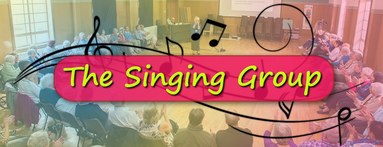
The leader of the event yesterday, Diana Kerr, was passionate about the importance of music and song in all our lives, not just people with dementia. Music is integral to what it means to be human and it’s possible that ‘homo sapiens’ actually sang before he learned to communicate through speech. Babies develop in the womb listening to the heartbeat of their mothers; new mothers naturally hum or sing to their babies when they’re in need of comfort and babies’ first attempts to vocalise often seem like attempts to sing. Music is in our very souls. It reflects our moods and contains our memories as programmes such as Desert Island Discs show. It involves our bodies in what is often involuntary movement, whether it be simply tapping our feet or moving to the beat in more conscious movement and dance. Nietzsche suggests that we listen to music with our muscles and Schopenhauer asserted “the inexplicable depth of music …….is due to the fact that it reproduces all the emotions of our innermost being”.
All of this is true of listening to music but more so if we can make music through singing and playing an instrument and even more true when it’s done with other people - thus singing groups for people with dementia and their carers. Dianna had many heart- warming stories of people whose memory might have gone but whose souls were touched through singing. One such story was of a woman with dementia who had not spoken for five months, who no longer showed any facial expressions and seemed to be living in a world of her own. She was brought to the singing group by her husband and at first appeared agitated, just sitting and staring. However as the singing got underway she started to tap her thigh, then moved her body and began to make some humming noises. By the end of the session she was singing and smiling. But not only that the day after the session she woke up and told her husband they should bake a cake – which they did!
Music is at the heart of religion. What is religion after all but listening to the heartbeat of the universe, the heartbeat of God? What is religion but an inadequate way of expressing that heartbeat, that silent music that is the very music of the spheres? What is religion but discerning how to live in tune with this heartbeat and offering practices to make this a reality in people’s lives? There isn’t a culture or religion that doesn’t express itself in music even though those expressions are different, reflecting the culture in which the religion grew up. Even Islam that seems to forbid singing and dancing as frivolities has its chanting of the Qur’an and Sufi chanting is very evocative as is the dancing of the whirling dervishes. St Augustine, who is reputed (probably wrongly) to have said that to sing is to pray twice, also reputedly said the song of the lips must first have been a song in the soul. And a song in the soul can surely only come from a relationship with what some of us might call God and others Ultimate Reality. It comes from a discerning heart. It is to hear the primal sound of the universe which Hindus claim to be OM, the chanting of which unites us with the very heartbeat of life that flows through all of creation and all sentient beings. For Jews and Christians singing is an essential part of worship as too is the singing of bajans or devotional songs within Hinduism and Sikhism – all ways of expressing joy, hope, love, worship but also awakening these attitudes within us as we sing. But singing or music can also express longing, grief, despair, hope, all the human emotions that people have to struggle with in their journey to make sense of the small part of the universe they inhabit. It can give expression to realities that cannot otherwise be put into words.
This can be true, of course, for those who are not religious. A few years ago Michael Graziano, a neuroscientist and atheist spoke of his relationship with music being similar to religious experience. Speaking about his love for Mozart he said he could sense a presence. “The piece has a persona. It has a palpable spirit and I feel as though I can have a personal relationship to that spirit. My brain is treating the music like a universe of complexity and investing that universe with its own deity, for whom I feel some measure of awe and reverence. My relationship to the music is, in the most fundamental sense, the same as a religious relationship to the real world”. I have no difficulty in believing this – that we all hear the presence that is life, that some would call God, in different ways and through different media. But surely it is the same Reality? And surely music gives us another language for dialogue?


 RSS Feed
RSS Feed
